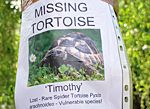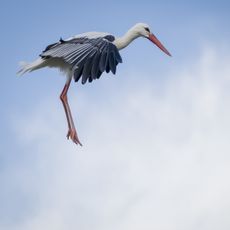Lock up your tortoises
Be careful as your tortoise emerges from hibernation: large numbers are being stolen to meet increasing demand


As tortoises begin to emerge sleepily into the bright spring, their owners are being warned to lock them up and install CCTV in the garden because thefts soared last year. ‘Rare pets mean top prices, and that's the lure,' explains John Hayward, co-ordinator of the National Theft Register. He advises tortoise owners to take detailed photographs of their animals and have them microchipped.
Tortoise charities say the Government has failed to halt the growth of illegal imports, apparently chiefly from Slovenia; the Tortoise Protection Group is to present Defra with a petition to ban imports (www.tortoise-protection-group.org.uk).
The increase in thefts has coincided with the animals being given a UN priority ranking as an endangered species. Now, those that are more than 10cm in length have to be microchipped and can't be sold legally without a certificate saying they were bred in captivity. This has increased the value of varieties such as Hermann and spur-thighed, which sell for up to £165. Defra's Nevin Hunter reports: ‘They come in thousands at a time, and we suspect a large proportion come in illegally. We've come across a lot of forged paperwork.'
The Tortoise Trust adds: ‘We have serious doubts about the true origin of some of these animals. We are also concerned at the manner in which they are shipped via networks of "distributors" and dealers, many of whom falsely claim to be breeders, and at the growth in internet sales of live animals. We totally oppose this practice.'
* For more country news like this every week, subscribe and save
Sign up for the Country Life Newsletter
Exquisite houses, the beauty of Nature, and how to get the most from your life, straight to your inbox.
Country Life is unlike any other magazine: the only glossy weekly on the newsstand and the only magazine that has been guest-edited by HRH The King not once, but twice. It is a celebration of modern rural life and all its diverse joys and pleasures — that was first published in Queen Victoria's Diamond Jubilee year. Our eclectic mixture of witty and informative content — from the most up-to-date property news and commentary and a coveted glimpse inside some of the UK's best houses and gardens, to gardening, the arts and interior design, written by experts in their field — still cannot be found in print or online, anywhere else.
-
 A well-connected rural playground with 23 acres on the edge of the South Downs National Park
A well-connected rural playground with 23 acres on the edge of the South Downs National ParkOld House Farm is an impressive family home with a wealth of amenities that would inspire any rural passion.
By Arabella Youens Published
-
 The UK gets its first ‘European stork village’ — and it's in West Sussex
The UK gets its first ‘European stork village’ — and it's in West SussexAlthough the mortality rate among white storks can be up to 90%, the future looks rosy for breeding pairs in southern England.
By Rosie Paterson Published
